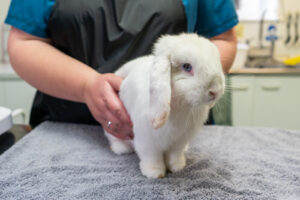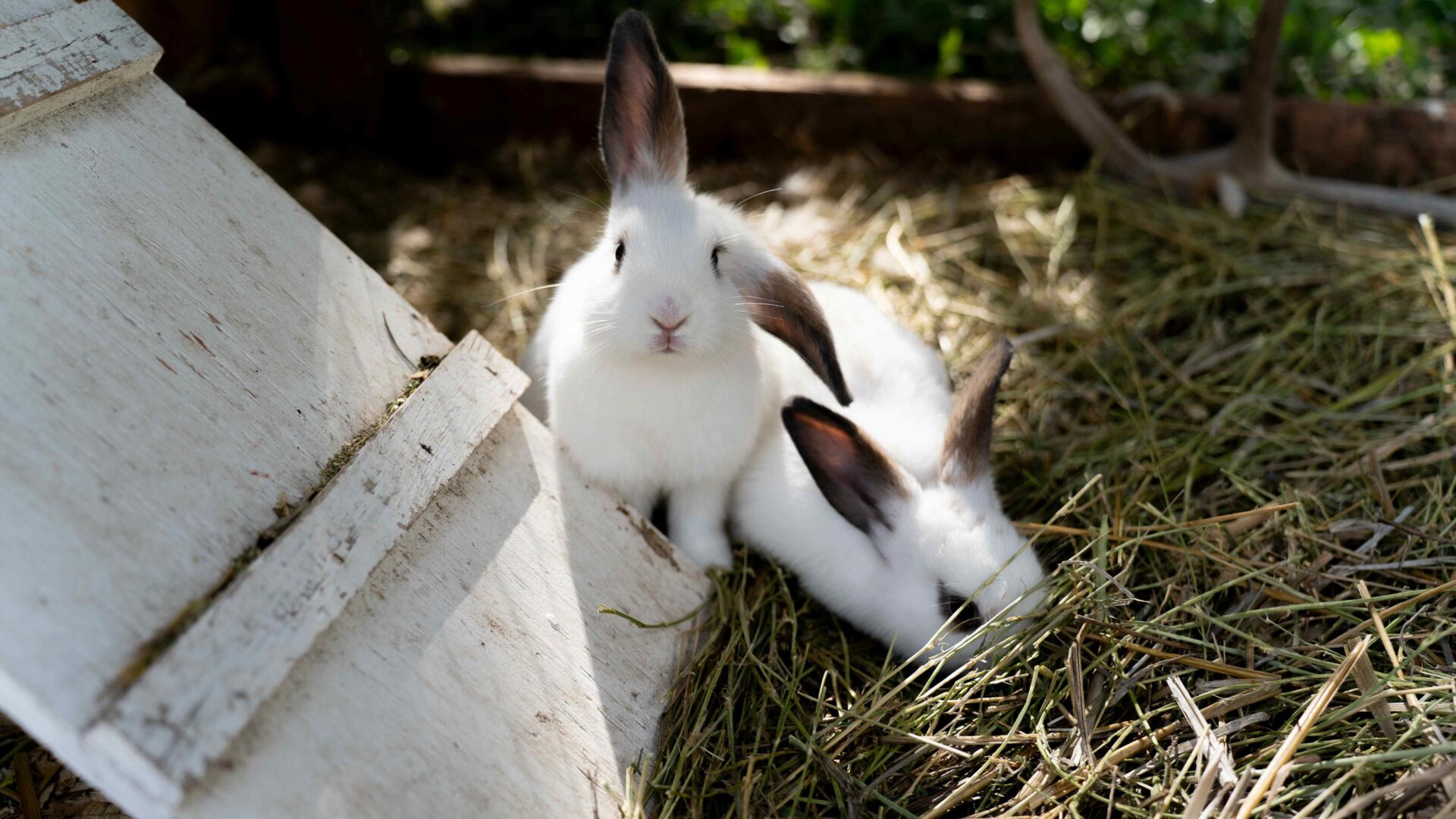Updated: 15/01/25
Neutering is an operation that stops rabbits from being able to have babies, prevents certain behavioural issues, has health advantages and reduces the strain on rescue centres by helping to prevent multiple litters being born.
Unneutered female rabbits are more likely to develop womb cancer, and neutering male and female rabbits prevents unwanted sexual advances from males and hormonal behaviours in females.
You can neuter rabbits from the age of four to five months, and your vet will be able to advise you on the right time.
Please speak to your vet practice to learn more or book a neutering appointment.
On this page:
- What is rabbit neutering?
- Should I get my rabbit neutered?
- Benefits of neutering male rabbits
- Benefits of spaying female rabbits
- What age should I get my rabbit neutered?
- What is the normal breeding cycle for a female rabbit?
- What happens when my rabbit is neutered?
- How long will it take my rabbit to recover after being neutered?
- What complications might my rabbit experience during recovery?
- Will my male rabbit be sterile straight away once castrated?
- Will my rabbit’s weight change once they have been neutered?
What is rabbit neutering?
The term ‘neutering’ refers to an operation that is done to prevent a rabbit from being able to reproduce and to stop certain sex-driven behaviours.
This is often referred to as a ‘castration’ in male rabbits and a ‘spay’ in female rabbits.
Should I get my rabbit neutered?
Neutering both male and female rabbits has many advantages, unless you want to breed from them.
There are numerous health and behavioural benefits to neutering rabbits, as well as preventing multiple litters when there are already many lovely rabbits in rescue centres looking for good homes.
Benefits of neutering or castrating male rabbits:
- Allows bonding of a male/female pair. You can find out more about bonding rabbits here.
- No unplanned litters.
- Removes the risk of testicular cancers.
Other possible benefits:
- Reduce urine marking.
- Make litter training easier.
- Reduce aggression.
- Reduce sex-driven behaviours.
- Reduce the risk of prostate disease.
Benefits of neutering or ‘spaying’ female rabbits:
- Allows bonding of a male/female pair. You can find out more about bonding rabbits.
- No unplanned litters.
- Prevents false pregnancies and associated behavioural issues.
- Prevents uterine (womb) cancer, which is otherwise very common in unneutered females.
- Prevents pyometra (infection of the womb), which can be life-threatening.
- May reduce aggression and territorial behaviours.
Apart from the health benefits outlined above, neutering is also very important for behavioural reasons.
Male-female pairings will often benefit if both parties, as opposed to just one, are neutered.
Neutering prevents unwanted sexual advances from an uncastrated male or repeated false pregnancies in an unneutered female, both of which may cause stress and subsequent aggression.

At what age should I get my rabbit neutered?
Rabbits are usually sexually mature by around four months of age in small breeds, and six to nine months of age in larger breeds.
To prevent mating, if not being neutered, rabbits should be split into single sex groups from 16 weeks of age.
Males and females can usually be neutered from approximately four to five months old, however, this may be influenced by several factors, so discuss your rabbit’s individual situation with your vet.
Veterinary Surgeon Honor Etherington (BVM&S MRCVS) says:
Neutering rabbits and keeping them in pairs is essential for a good quality of life. Rabbits are strongly social animals and need a companion for their welfare and wellbeing. Neutering reduces aggression from territory conflict and sex drive allowing peaceful, bonded companionship that can last a lifetime. It can also prevent some life-threatening health problems as well as pregnancies.
What is the normal breeding cycle for a female rabbit?
The act of mating in rabbits stimulates eggs to be released, and a non-fertile mating can lead to a false pregnancy lasting approximately 16 to 18 days.
Successful pregnancy in rabbits lasts around 31 to 33 days, and after giving birth, female rabbits only nurse their young once or twice a day.
Baby rabbits (kits) are usually weaned at around four to five weeks of age.
What happens when my rabbit is neutered?
If your rabbit is booked in to be neutered, they will visit the veterinary practice as a day patient. If they are already part of a bonded pair, their partner should accompany them.
They will often be admitted in the morning, and unlike for human operations, you will not be asked to withhold their food or water beforehand. Your practice may even ask you to bring a packed lunch of your rabbit’s favourite foods to support them during their visit.
It is very important that rabbits always have continuous access to food to support their digestive tract.
They also can’t vomit like cats and dogs, so we do not need them to have an empty stomach for their anaesthetic.

When you drop your rabbit off, a member of the veterinary team will talk you through what will happen and ask you to sign a consent form.
You will also have the chance to ask any questions. If your rabbit is not already microchipped, it is worth considering having this done at the same time.
No anaesthetic is completely risk-free, but modern veterinary medicine means that routine procedures such as neutering are generally very safe in rabbits. Older rabbits or those with ongoing health issues may carry a greater anaesthetic risk.
Your rabbit will then be taken through onto the ward, be weighed and have a check over prior to their operation. Some practices avoid this on the day of surgery to reduce stress and may do it at an earlier point.
Both male and female rabbits are neutered under a general anaesthetic. This means your rabbit is deeply asleep for the procedure and unable to feel any pain.
General anaesthetics can be achieved using different combinations of drugs, and your vet will decide on the best combination to use based on your rabbit’s individual health situation.
Your rabbit may have a clipped patch on one or both of their ears from where the veterinary team has accessed their veins.

When male rabbits are neutered, a small amount of hair is removed from around the surgical site and the area is cleaned.
Castration may be done pre-scrotally (where the cut to remove each testicle is made just above the scrotum), scrotally (where the cut is made in the scrotum itself) or abdominally (where the cut is made into the abdomen, for example, in the case of testicles which have not descended).
Depending on the location of the surgery, once the testicles have been removed, the cuts are then closed by opposing the skin together/using tiny stitches and/or applying a small amount of surgical skin glue.
When female rabbits are neutered, they will have a clipped patch on the underside of their tummy, this area is then cleaned for surgery.
A small cut is made through the skin and muscle to open the abdomen and the ovaries and womb (ovariohysterectomy) are removed. The muscle and skin are then closed with stitches.
Pain relief is given before the operation so that it will already be working when the anaesthetic has worn off.
A nurse will monitor your rabbit while they wake up and, once ready, will offer them some food. Most rabbits will be allowed home the same day.
When you collect your rabbit, you will be advised on whether they need a medical t-shirt to protect their wound, what pain relief they have had and need, what you should feed them, for how long they need to rest and when they need to have a follow-up appointment.

How long will it take my rabbit to recover after being neutered?
The most important thing after an anaesthetic is to get your rabbit back to eating normally as soon as possible.
Use of pain relief and yummy, tempting foods helps with this. Your rabbit should be eating the day following their operation. Most rabbits feel back to themselves within a few days and can be signed off completely after 10 days.
If you are concerned about your rabbit’s recovery, you can speak to the veterinary team.
What complications might my rabbit experience during recovery?
Most rabbits have smooth recoveries after being neutered, and many can be signed off after about 10 days. For those that experience complications, these can include:
- Lack of appetite – it is very important that your rabbit returns to eating normally as soon as possible after their surgery. Pain relief and offering lots of tempting food can assist with this. If your rabbit is refusing food, call the practice for further advice.
- Mild irritation where the surrounding fur has been clipped for surgery (‘clipper rash’).
- Infections in the surgical wound – this is often associated with the wound getting wet, dirty or being nibbled by the rabbit.
- Wound breakdown – this is where the wound fails to heal normally and may start to open. This is often associated with infections, from nibbling or reactions to sutures. It is important that your rabbit rests so the wound can heal properly, so don’t give them full access to the garden or stairs until the vet or vet nurse has signed them off.
It is generally sensible to monitor that your rabbit is eating, drinking and toileting okay and that they don’t seem excessively quiet or out of sorts.
When checking your rabbit’s wound, it should be clean and dry, with no signs of redness, stickiness (discharge) or swelling.
The risk of flystrike increases during the warmer months, and wounds will often attract flies, so this is something to be very careful of and check thoroughly for.
If you notice anything that worries you, your rabbit isn’t eating as much as normal, or you feel the wound has suddenly changed in appearance, then reach out to your veterinary team for support ahead of the scheduled post-operative checks.

Will my male rabbit be sterile straight away once castrated?
No, it can take up to six weeks after castration for males to become sterile so they should be kept apart from unneutered (unspayed) females until this time. If bonded, allow contact with mesh or cage between them to maintain the bond.
Will my rabbit’s weight change once they have been neutered?
Neutered rabbits may put on weight more readily. If you are concerned about this, speak to your veterinary team about how you can adjust your rabbit’s diet and increase their exercise once recovered.
If you have any further questions about neutering your rabbit or would like to book them in for this procedure, please contact your local veterinary practice for further support.
Find a vet
With many thanks to Deborah Stafford MA VetMB MRCVS GPCertExAP for contributing to this content.
Useful resources:
- RWAF – Neutering – Castration and spaying: https://rabbitwelfare.co.uk/neutering-castration-and-spaying/
- RVC – Rabbit neutering (spaying and castrating): https://www.rvc.ac.uk/small-animal-vet/general-practice/practice-services/routine-pet-healthcare/neutering-spaying-pet/rabbit-neutering
Found this article useful? You may also like:

